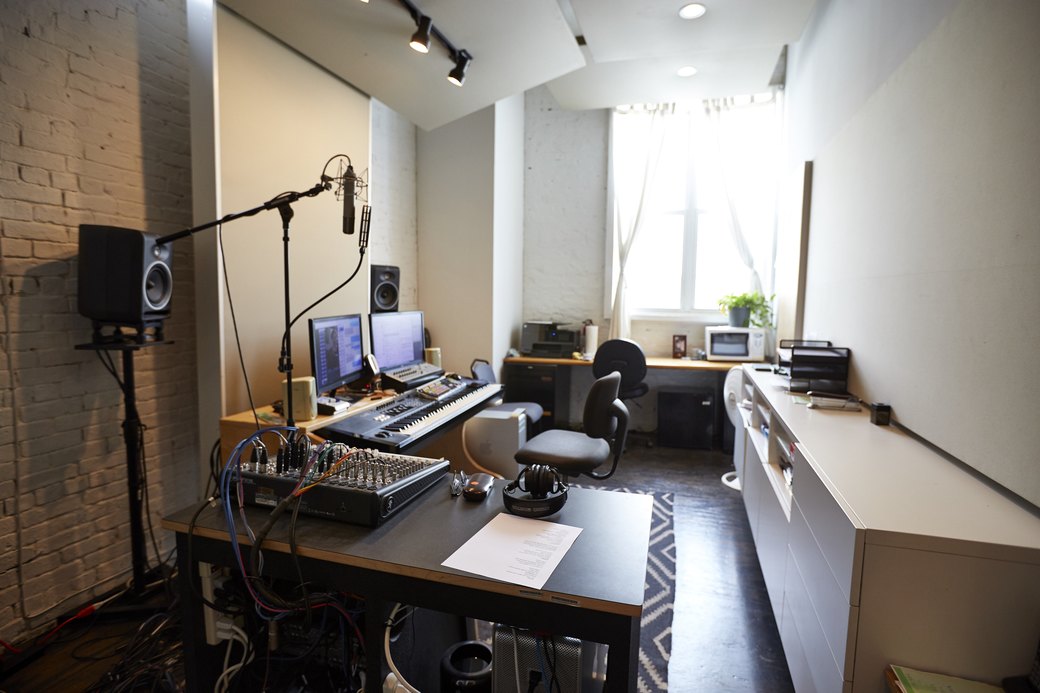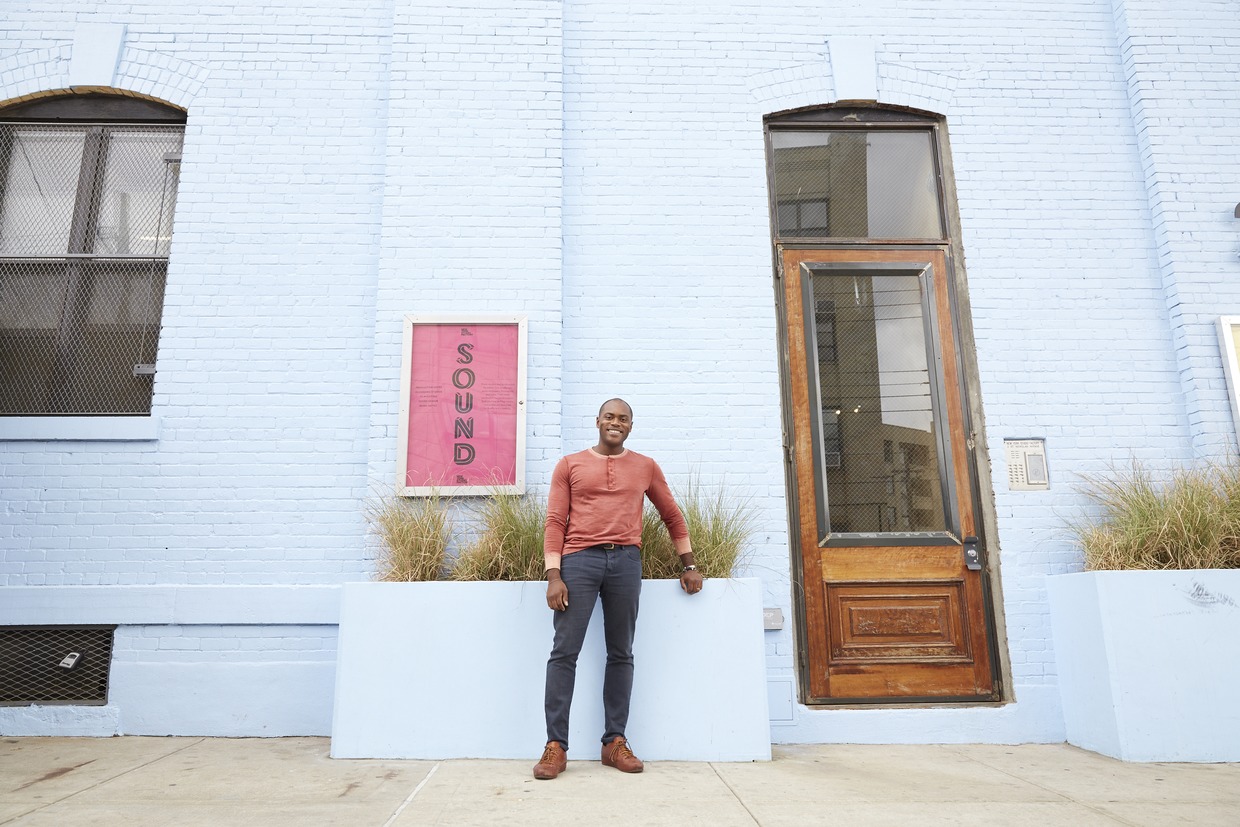

Joseph Woolridge, founder of New York Studio Factory, is a born and raised Brooklynite from Crown Heights. “I was born in Kings County Hospital,” Woolridge says. “That’s a New Yorker question, ‘Which hospital were you born at?’”
Woolridge studied painting at Cooper Union and has spent the last 13 years providing studio space to creative professionals across North Brooklyn. “I’ve always had a loft,” he says. “That’s basically how I got started, out of necessity. I needed space to live, then I needed space to paint, and I’ve always been good about getting myself enough space.”
“So initially, while I was at Cooper, I took a loft and chopped it up. I created four rooms, lived in one, the other three I rented out, so I was able to make a few dollars and live rent free. I just kept doing that and always had lofts that I either converted or lived in myself.”
We can all relate to the need for space in New York City. It’s a constant struggle to find space to live and, for creatives, space to work and develop your art. And it seems perhaps that Woolridge had found a way to make it work for himself. And maybe it could be a business as well.
In 2003, using all of his savings, Woolridge bootstrapped and developed his first solely commercial space in The Roebling Tea Building.

“I took 6,000 square feet,” he says. “And chopped it up in 15 work spaces. But at the time I didn’t have enough money to put the walls up.” Woolridge had spent all of his savings on the lease, and renovations, building new bathrooms, repairing the windows, and he put up the studs for where the studio walls would go, but had to stop construction there. He had run out of money.
“So I just started marketing the studio spaces,” he explains. “And luckily, I was able to pre-lease all the spaces.” With the new members’ first, last, and security payments, Woolridge was able to hire a few men and finish the construction. “Now 13 years later, the same guys are still working for me.”
Three years after opening studios at the Roebling Tea Building, Woolridge opened another location at 44 Stewart in East Williamsburg. Using the same bootstrapping process, he leased 16,000 square feet.
“I used a little bit of money to get into the deal,” Woolridge says. “Then renovated the space, the restrooms, enough to show people. But this time, since the floor plate was bigger, we just put down the tracks for the walls. We didn’t even have enough money for studs.”
“But then we pre-leased 75 percent of the space and finished the work. Ya know, we’d rent a few studios, then buy some sheetrock. Rent a few more studios, buy a few doors. It just worked out!”

Suddenly, Woolridge had a growing business, henceforth known as New York Studio Factory. With space at the Roebling Tea Building and the initial lease at 44 Stewart Ave. in Bushwick, Woolridge leased an additional 3,000 square feet at Stewart to test out a new audio production suite model, which has succeeded tremendously.
New York Studio Factory is now home to a number of professional audio producers and mixers including Dan Walker with The Submarine Studio and prolific DJ and producer Sammy Needlz.
“The following year,” Woolridge says, “we took on 88 N. 1st, which is 5,000 square feet, and right after that, we did 2 St. Nicholas, at 13,000 square feet.”

You may recognize Bushwick’s 2 St. Nicholas as “The Blue Building”, which is a former ladder factory. “It was the Putnam Rolling Ladder Factory,” Woolridge says. “They make those antique rolling ladders at libraries. They’re still in business.”
But that brings up an important subject: the pros and cons of new businesses taking space in Brooklyn neighborhoods. “When we come in we add tremendous value,” Woolridge says. “We reposition the real estate. And also, our member base is amazing.”
Certainly, Brooklyn is changing. That’s easy to say. But what does that like for a Brooklyn native, someone who was born and raised here? How does he feel about the direction Brooklyn is heading? What does that mean for the New York Studio Factory or other small business owners?

“I think it’s great,” Woolridge says. “I think it’s amazing. I love collaboration. That’s just the way I always thought about real estate or creating art or making a business. It’s really a collaboration. When new people from different parts of the world, from different parts of the country, when they move here with their perspectives and their ideas, they’re collaborating with what was already here.”
“Me, personally, I think it’s a great thing. It’s just an evolution. Every thing, every business, every person, is going to evolve or not. And Brooklyn is evolving and I think it’s amazing.”
And Woolridge is sure to continue the evolution of his business. Last year, at 2 St. Nicholas, he repositioned the space as a yoga center with coworking called The Common, though it didn’t have the audience he had expected and he renovated the space to include studios again.
But Woolridge does see a surfeit of speculative investors and shortsighted developers coming into Brooklyn. “I’m actually speaking with a few people who have reached out to me,” Woolridge says. “They’re looking to get into this type of business, ya know, and my first advice is always to really vet the neighborhood, vet the deal, make sure there’s actually demand for the service or product that you’re offering.”
“There’s a lot of developers now who come into areas like Brooklyn and they read about it, they do some soft research on these neighborhoods, and it looks like a great opportunity so they’ll gobble up 200,000 square feet, 400,000 square feet … Right now there’s a real saturation of developers who have no clue what they’re doing. And they should be reaching out to guys like me.”
Featured image: Joseph Woolridge outside of the New York Studio Factory at 2 St. Nicholas Avenue in Bushwick. Photo by Angela Altus, courtesy of New York Studio Factory.


